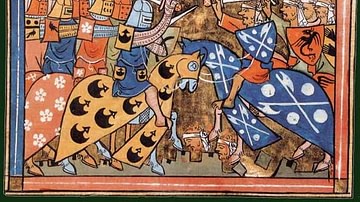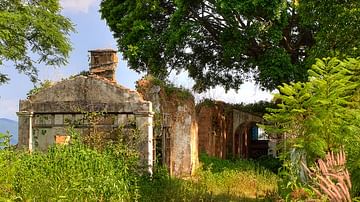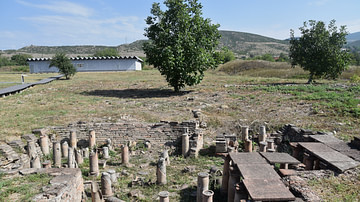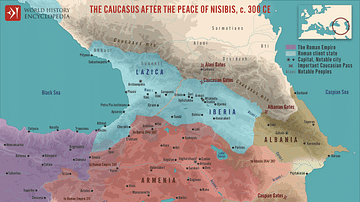Search
Did you mean: Thera?
Search Results

Definition
War of the Sixth Coalition
The War of the Sixth Coalition (1813-1814), known in Germany as the Wars of Liberation, was the penultimate conflict of the Napoleonic Wars (1803-1815). The Sixth Coalition, which included Russia, Austria, Prussia, the United Kingdom, Sweden...

Definition
War of the Fifth Coalition
The War of the Fifth Coalition (1809) was a major conflict of the Napoleonic Wars (1803-1815) that was fought primarily in Central Europe between the First French Empire and its client states against the Austrian Empire, supported by the...

Definition
Etruscan Pottery
Etruscan pottery, produced over five centuries, was nothing if not varied. Indigenous wares such as the glossy black bucchero were made alongside red- and black-figure pottery imitating, yet modifying those produced in the Greek world. Geometric...

Definition
Carthaginian Warfare
Carthaginian warfare has been overshadowed by defeat to Rome in the Punic Wars, but for six centuries before that Carthage was remarkably successful in conquering lucrative territories in North Africa, the Iberian Peninsula, and Sicily. By...

Article
The Armies of the Crusades
The armies of the Crusades (11th-15th centuries CE), which saw Christians and Muslims struggle for control of territories in the Middle East and elsewhere, could involve over 100,000 men on either side who came from all over Europe to form...

Article
Mark Antony's Parthian Campaign
In 36 BCE, Mark Antony (83-30 BCE) invaded Parthia, hoping to render himself one of the great conquerors of the Greco-Roman world, but he was stymied by Parthian forces and obliged to undertake an arduous, costly retreat. What to make of...

Interview
Interview: Living in Silverado: Secret Jews in the Silver Mining Towns of Colonial Mexico
Professor Emeritus David Gitlitz is one of the world’s leading experts on Jewish-Catholic interactions in Iberia and the Americas. While initially drawn to the literature of the Spanish Golden Age as a student at Oberlin and Harvard, the...

Image
Dzalisa Archaeological Site, Georgia
Dzalisa is an archaeological site in Georgia dating back to the ancient kingdom of Iberia. It is situated in the Mukhrani valley, some 20 kilometres (12.4 mi) northwest of Mtskheta, and features remnants of a fortified city and various structures...

Image
The Caucasus after the Peace of Nisibis, c. 300 CE
A map illustrating the Caucasian states after the First Peace of Nisibis in 299 CE depicts a period of geopolitical stability and well-defined borders between the Roman and Sassanid Empires. This treaty, aimed at settling disputes and establishing...

Definition
Knights Templar
The Knights Templar were established c. 1119 and given papal recognition in 1129. It was a Catholic medieval military order whose members combined martial prowess with a monastic life to defend Christian holy sites and pilgrims in the Middle...